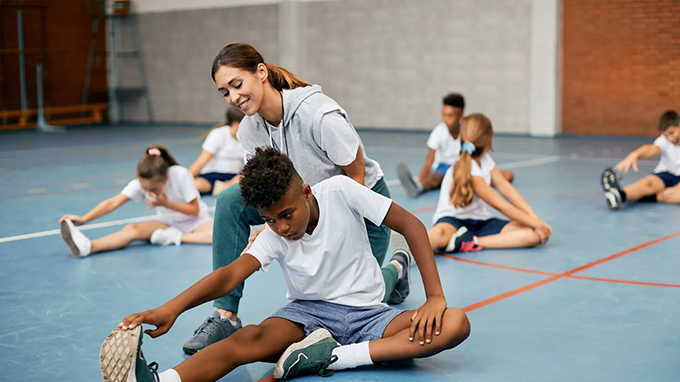
The heart begins to accelerate, the tremors are recurrent, the clock passes slowly and we can only think about the remaining turns to make that jump, that 100 meter dash or that somersault that everyone is going to judge… Can anyone remember? A similar situation in physical education class?
Fear of failure, understood as the fear of not meeting one’s own and others’ expectations, is a psychological barrier that makes satisfaction difficult and reduces the feeling of feeling competent in classes. We can distinguish two facets or dimensions: the cognitive, when doubts appear, and the emotional, when shame or self-devaluation is felt.
In Physical Education classes, fears restrict students’ freedom of action by inhibiting emotions (for example, enjoyment) and thoughts (for example, “I know I can do it”), thus harming learning. The perception of real events can be modified by thoughts that maximize feelings of vulnerability .
The importance and necessity of the ruling
Error is essential in the adventure of learning: those who do not fail do not learn. He who does not fail is not capable of discerning for himself between failure and success. Therefore, if we are trying to learn while focusing on not making mistakes, our anxiety increases and our performance decreases.
These fears are magnified in the stage of adolescence, in which our behaviors and attitudes are guided by social reference (for example, comparing ourselves). During adolescence we are especially sensitive to the environment and the attitudes of our peers, so the fear of failing can become paralyzing .
The objective in Physical Education classes
Often in Physical Education classes, the teachers’ job seems to be to establish a specific objective, the achievement of which requires passing. Students are faced with the requirement of mastering a certain motor skill that they must also test in front of their classmates. If failing makes us afraid or we consider ourselves not achieving the objective, we reduce possible learning to an evaluation of previous skills and leave little room for improvement to true learning.
We propose some guidelines to prevent students from falling prey to the fear of failing, and so they can explore the proposed activities freely and truly learn:
- Support learning autonomy : implement a teaching style that promotes students’ autonomy and decision-making in their efforts, for example by creating activities where students make their own work scheme and execute it.
- Promote intrinsic motivation : strategies such as self-analysis of effort, effectiveness and self-reinforcement to act without fear of external pressures or “what people will say”. In this way, we will help executing a task connect your learning with feelings of pleasure, health and personal well-being.
- Set real and agreed upon goals : Allow students to achieve their goals with enough of a combination of ambition and realism to encourage a sense of competition. For example, at the beginning of the sessions, we can make a list of objectives of varying difficulty where “it only matters that each person looks for the one that is a personal challenge.”
- Reduce comparisons : redefine success as something individual and not conditioned by what others can do. Do not score more or less based on achievement, but simply value individual effort along with learning to self-reinforce yourself, seeking to overcome the “self of yesterday” and hoping to strengthen yourself for the “self of tomorrow.”
- Provide opportunities for opinion : with this we will ensure that students feel able to express their feelings and concerns, thus being able to assess their situation, readjust it if necessary and how to deal with it. For example, we can hold a small assembly at the end of the sessions to share experiences and extrapolate the day’s teachings outside of school.
Facilitate a fearless learning climate
In this way, teachers can facilitate learning climates that allow students to function without feeling afraid of failing, with the feeling that learning tasks are challenges rather than demands, with an empathetic understanding of their own performance and that of others in place of social comparison. We can also offer access to resources to regulate emotions and rethink thoughts that appear in the agony of making mistakes.
Ultimately, it is about accompanying the progress of students, rewarding both their effort and effectiveness in their path towards higher-level learning goals.
Author Bios: Juan González-Hernández is Full Professor-Sport Psychologist at the University of Granada, David Manzano Sánchez is Didactics of Body Expression; Hired professor doctor at the University of Extremadura and Manuel Gomez Lopez is Professor of Fundamentals and Specialization in Handball at the University of Murcia
